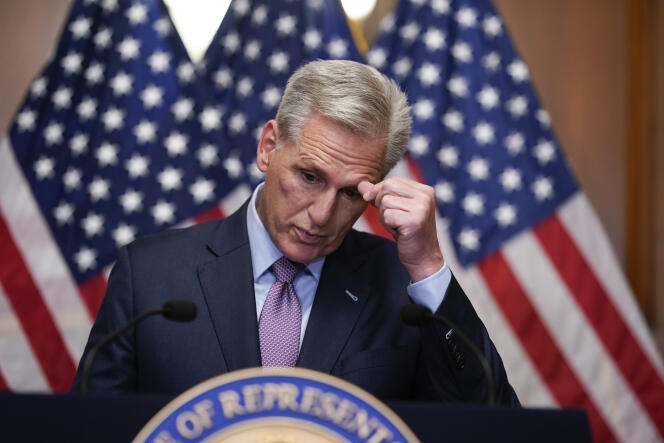


The implosion of the Republican Party has been a soap opera of twists and turns ever since it fell under the sway of Donald Trump seven years ago. On Tuesday, October 3, it was further compounded by a historic episode that was both expected and implausible. Kevin McCarthy, the 55th speaker of the United States House of Representatives, was ousted after the vote on a motion of no confidence launched by dissenting voices from his own party. At the end of the afternoon, the elected representatives were called back one by one, in alphabetical order. The air seemed to be getting thinner in the galleries. In the end, 216 votes – eight of them Republican – were enough, due to absences, to put the speaker out, in the face of just 208 votes on his side.
At the end of the vote, Patrick McHenry (North Carolina), appointed interim speaker, almost smashed the gavel in anger, as he adjourned the meeting. Frustration and helplessness dominated: No succession plan existed. The Grand Old Party (GOP) leadership decided to give itself a week for candidates to emerge, a rather staggering delay in view of budgetary urgencies. Elected officials have until November 17 to pass a federal funding bill. "We're in uncharted territory," acknowledged James Comer (Kentucky). Beyond this unprecedented political chaos, McCarthy's fall is fraught with threats for Ukraine. What will become of the $24 billion (€22.9 billion) the White House had hoped to extend in support of Ukraine? Will the next Speaker of the House have to give new pledges to the mutineers to drastically limit aid to Kyiv?
McCarthy has already announced that he will not seek re-election as speaker. "It's been an honor to serve," he said. To everyone's surprise, he appeared before the press after the vote to defend his record and the practice of compromise. Seemingly relieved of a burden, he attempted a few jokes, as if to attempt to bury the humiliation he had just suffered. "I made history, didn't I?" Any advice for his successor? "Change the rules!" The elected official also dared to make a comparison between Russian President Vladimir Putin and Adolf Hitler in the 1930s, on the subject of the annexations of territory they have undertaken and their spirit of revenge, baffling Ukraine and Afghanistan in the process. It was too late to get out of the rhetorical ambiguities.
McCarthy missed both a strong entrance and a strong exit. In January, he snatched this position at the end of the 15th round of voting, already after enduring an ordeal inflicted by some 20 extremist elected representatives. They obtained major concessions in terms of operating rules and positions. In particular, McCarthy agreed that only one elected representative could request a motion of no confidence. This week, that elected official was his most venomous detractor, Matt Gaetz (Florida). This 41-year-old staunch Trumpist, omnipresent on television, is little known for his investment in technical issues. He comes alive in front of the cameras and thrives on controversy. On Tuesday, he was levitating with power-hungry vanity. But he wasn't the only agent of McCarthy's destruction.
You have 66.05% of this article left to read. The rest is for subscribers only.
